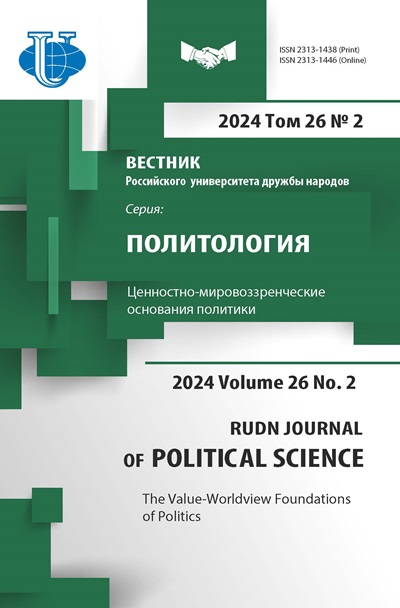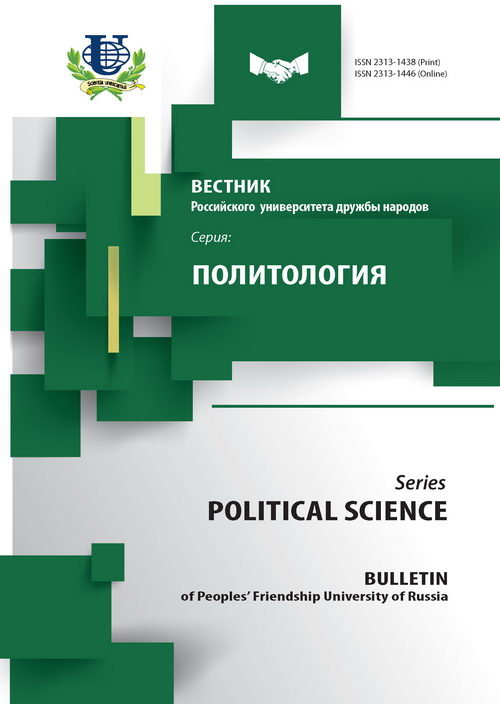Политическое значение исламского фундаментализма в эпоху постмодерна
- Авторы: Почта Ю.М.1, Оберемко Т.В.1
-
Учреждения:
- Российский университет дружбы народов
- Выпуск: № 1 (2014)
- Страницы: 5-19
- Раздел: СТАТЬИ И ОБЗОРЫ
- URL: https://journals.rudn.ru/political-science/article/view/8991
Цитировать
Полный текст
Аннотация
Статья посвящена рассмотрению политического значения исламского фундаментализма в контексте кризиса современного глобализирующегося общества, в котором сосуществуют элементы обществ премодерна, модерна и постмодерна. Поэтому, доказывается в статье, широко применяемый подход к объяснению исламского фундаментализма с позиций науки эпохи модерна нуждается в дополнении подходом на основе постмодернистских концепций. В западном обществе продолжается процесс формирования новой постсекулярной социальности (переход от незавершенного модерна к постмодерну), однако большая (незападная) часть человечества не имеет прямого отношения к этим процессам. Население этих незападных обществ, а также некоторые социальные слои Запада, воспринимая вызовы современности как угрозу своему существованию, ищут спасения в консерватизме и традиционализме. Одним из выражений этого неприятия современности является исламский фундаментализм.
Об авторах
Юрий Михайлович Почта
Российский университет дружбы народов
Email: yuriy_us@hotmail.com
Кафедра сравнительной политологии
Татьяна Валентиновна Оберемко
Российский университет дружбы народов
Email: timo_rudn@pochta.ru
Кафедра теории и истории международных отношений
Список литературы
- Армстронг К. Битва за Бога: история фундаментализма. — М.: Альпина нон-фикшн, 2013.
- Бжезинский З. Последний суверен на распутье // Россия в глобальной политике. — 2006. — № 1, январь-февраль. URL: http://www. globalaffairs. ru/number/n_6319.
- Бодрийар Ж. В тени молчаливого большинства, или конец социального. — Екатеринбург, 2000.
- Гречко П.К. Темпоральная многослойность социального: современность как вызов // Социальное: истоки, структурные профили, современные вызовы. — М.: Российская политическая энциклопедия, 2009.
- Кирабаев Н.С. Кризис «современности» и современные проблемы философской методологии // Диалог цивилизаций и посткризисный мир. — М.: РУДН, 2010.
- Корм Ж. Религиозный вопрос в ХХI веке. Геополитика и кризис модерна. — М.: Институт общегуманитарных исследований, 2012.
- Кудряшова И.В. Исламская цивилизационная доминанта и современное развитие мусульманских политий // Политическая наука: новые направления. — 2003. — № 2.
- Кудряшова И.В. Как изучать взаимодействие религии и политики? // Политическая наука: религия и политика. — 2013. — № 2.
- Кырлежев А. Постсекулярная эпоха // Континент. — 2004. — № 120.
- Ланда Р.Г. Политический ислам: предварительные итоги. — М., 2005.
- Малашенко А. Каким нам видится ислам // Россия в глобальной политике. — 2006. — Т. 4. — № 5. — Сентябрь—октябрь.
- Мальковская И.А. Знак коммуникации. Дискурсивные матрицы. — М.: КомКнига, 2005.
- Мальковская И.А., Почта Ю.М. Фундаментализм: угроза или спасение? // Социальное: истоки, структурные профили, современные вызовы / Под общ. ред. П.К. Гречко, Е.М. Курмелевой. — М.: РОССПЭН, 2009.
- Мчедлова М.М. Возвращение религии, или Новый мир: в поисках объяснения // Политическая наука: религия и политика. — 2013. — № 2.
- Мчедлова М.М. Религия и политические императивы: социокультурные реалии современности. — М.: РУДН, 2011.
- Паин, Э. Невольники общин // Новая газета. — 18 марта 2011.
- Почта Ю.М. Постсекулярное общество // Социальное: истоки, структурные профили, современные вызовы / Под общ. ред. П.К. Гречко, Е.М. Курмелевой. — М.: РОССПЭН, 2009.
- Саррацин Т. Германия: самоликвидация. — М.: Рид Групп, 2012.
- Фарес С. Революция грядет: борьба за свободу на Ближнем Востоке. — М.: Эксмо, 2012.
- Хардт М., Негри А. Империя. — М.: Праксис, 2004.
- Barber, Benjamin R. Jihad vs. McWorld. — N.Y.: Ballantine Books, 2001.
- Esposito J.L. Unholy War: Terror in the Name of Islam. — Oxford: Oxford Univ. Press, 2002.
- Giroux H.A. Beyond the Spectacle of Terrorism: Global Uncertainty and the Challenge of the New Media. — London: Paradigm Publishers, 2006.
- Jayasuriya K. September 11, Security, and the New Postliberal Politics of Fear // Неприкосновенный запас. — № 6 (4/2004). URL: http://www.nz-online.ru/print.phtml?aid=25011071.
- Philips K. American Theocracy: The Peril and Politics of Radical Religion, Oil, and Borrowed Money in the 21st Century. — N.Y.: Viking, 2006.
- Roy O. Globalised Islam: The Search for a New Ummah. — London: Hurst & Company, 2004.
- Smith Ph. Why War? The Cultural Logic of Irag, the Gulf War and Suez. —Chicago and London: The University of Chicago Press, 2005.
- Tibi B. The Challenge of Fundamentalism: Political Islam and the New World Disorder. — Berkeley: Univ. of California Press, 2002.
















